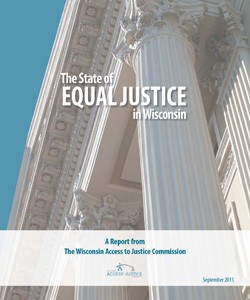 Indigent defendants in criminal cases, and select civil matters (i.e., child in need of protective services petitions, termination of parental rights petitions, Chapter 51 petitions, and Chapter 980 petitions), are entitled to the appointment of counsel when they cannot afford representation. Either the state public defender’s office represents the individual, or an attorney is appointed by the county. It is imperative that individuals facing some form of deprivation of their individual liberty and freedom, as in the aforementioned scenarios, be represented.
Indigent defendants in criminal cases, and select civil matters (i.e., child in need of protective services petitions, termination of parental rights petitions, Chapter 51 petitions, and Chapter 980 petitions), are entitled to the appointment of counsel when they cannot afford representation. Either the state public defender’s office represents the individual, or an attorney is appointed by the county. It is imperative that individuals facing some form of deprivation of their individual liberty and freedom, as in the aforementioned scenarios, be represented.
But, what happens in other types of civil matters, where there is no right to counsel? What happens when a person or family faces a legal issue that will affect their rights, health, safety, economic security, and overall well-being? All people, regardless of socioeconomic status, should have access to the justice system. While some individuals may be able to handle a matter pro se, meaningful legal assistance or full representation is often needed to assist individuals in asserting and defending their rights.
The Wisconsin Access to Justice Commission (WATJC) is one entity working toward “improving the administration of justice by supporting civil legal services to those who cannot afford them”. In 2011, Wisconsin became one of only four states nationally, and the only state in the Midwest, that failed to provide any state funding for civil legal services. The 2015-2017 budget appropriates $500,000 per year of the biennium for civil legal aid service to abuse victims. This sum is well below the other neighboring states. Minnesota, for example, appropriated over 12 million dollars per year of its biennium for civil legal services. According to WATJC, the average budget for indigent civil legal services in other Midwestern states is $7.6 million. While Wisconsin falls well below that average, it is at least an improvement that the current state budget appropriates some funding, albeit for a very specific class of litigants.
There are a variety of agencies that offer legal assistance and full-representation to indigent clients in civil matters. From my experience working at Centro Legal, I am aware that many more people were in need of assistance than that organization had the capacity to handle. While I cannot speak for other agencies, my best guess is that they also have more work than they can take on, and that as a result many people are turned away because there just isn’t the capacity to represent them. There are notable efforts to coordinate volunteer attorneys and to help people be matched with an attorney that would be willing to take on a case for a reduced rate. With low levels of funding from the state to support agencies already offering civil representation, the difference must be made up somehow. Whether it is volunteering to represent someone, participating as a volunteer at one of the several clinics offering brief legal advice, offering a reduced rate in certain circumstances, or offering support to practitioners that incorporate as a non-profit and offer reduced rates for indigent or modest means clients, all lawyers have a role to play in ensuring that access to justice and the legal system is not limited by one’s socioeconomic status. We all have a stake in improving access to civil legal service for people who cannot afford an attorney.
 Thanks to our September guest bloggers Michelle Velasquez and Christopher Guthrie, and welcome to our guest bloggers for October.
Thanks to our September guest bloggers Michelle Velasquez and Christopher Guthrie, and welcome to our guest bloggers for October.
